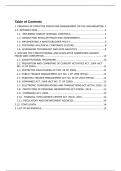Table of Contents
1. PRINCIPLE OF EFFECTIVE FRAUD RISK MANAGEMENT ON THE ORGANISATION. 2
1.1. INTRODUCTION............................................................................................... 2
1.2. IMPLEMENT ROBUST INTERNAL CONTROLS................................................2
1.3. CONDUCTING REGULAR FRAUD RISK ASSESSMENTS...................................3
1.4. IMPLEMENTING A WHISTLEBLOWER POLICY.................................................5
1.5. FOSTERING AN ETHICAL CORPORATE CULTURE...........................................6
1.6. LEVERAGING TECHNOLOGY AND DATA ANALYTICS.......................................8
2. DISCUSS THE CONSTITUTIONAL AND LEGISLATIVE FRAMEWORK AGAINST
FRAUD AND CORRUPTION.................................................................................... 10
2.1. CONSTITUTIONAL PROVISIONS..................................................................10
2.2. PREVENTION AND COMBATING OF CORRUPT ACTIVITIES ACT, 2004 (ACT
NO. 12 OF 2004)............................................................................................... 11
2.3. PROTECTED DISCLOSURES ACT NO. 26 OF 2000)......................................12
2.4. PUBLIC FINANCE MANAGEMENT ACT NO. 1 OF 1999 (PFMA):....................12
2.5. MUNICIPAL FINANCE MANAGEMENT ACT NO. 56 OF 2003 (MFMA).............12
2.6. COMPANIES ACT, 2008 (ACT NO. 71 OF 2008):..........................................13
2.7. ELECTRONIC COMMUNICATIONS AND TRANSACTIONS ACT (ECTA), 2002. .13
2.8. PROTECTION OF PERSONAL INFORMATION ACT (POPIA), 2013.................13
2.9. COMPANIES ACT, 2008..............................................................................13
2.10. FINANCIAL INTELLIGENCE CENTRE ACT (FICA), 2001..............................14
2.11. REGULATORY AND ENFORCEMENT AGENCIES..........................................14
2.12. CONCLUSION............................................................................................... 14
3. LIST OF REFERENCES....................................................................................... 15
,1. PRINCIPLE OF EFFECTIVE FRAUD RISK MANAGEMENT ON THE
ORGANISATION
1.1. INTRODUCTION
Effective fraud risk management is multifaceted, requiring a combination of robust
internal controls, regular risk assessments, a supportive whistleblower policy, an
ethical corporate culture, advanced technology, and strict compliance with legal
requirements. By adhering to these principles, South African organizations can
significantly mitigate the risk of fraud and protect their assets and reputation. The
legal framework, including the Companies Act, the Protected Disclosures Act, and
the Financial Intelligence Centre Act, provides a strong foundation for these
measures. Through diligent implementation and continuous improvement of fraud
risk management practices, organizations can navigate the complex landscape of
fraud threats and ensure their long-term sustainability and success.
Fraud is a pervasive issue that affects both consumers and businesses worldwide,
with a significant impact observed in South Africa. The COVID-19 pandemic
exacerbated the situation, leading to a surge in online fraud activities as reported by
the Federal Trade Commission (FTC) in 2021. The Association of Certified Fraud
Examiners (ACFE) highlighted that South African businesses lose approximately 5%
of their revenue to occupational fraud annually. Effective fraud risk management is
crucial for organizations in South Africa to mitigate these losses and safeguard their
interests. At the heart of effective fraud risk management are several key principles,
each supported by relevant legal frameworks and authoritative sources. This essay
will discuss the principles of effective fraud risk management within the South African
context, referencing relevant legal principles, legislation, and court cases to
substantiate the arguments.
1.2. IMPLEMENT ROBUST INTERNAL CONTROLS
The first fundamental principle is the implementation of a robust system of internal
controls. Corporate governance legislation, such as the King IV Report on Corporate
Governance in South Africa, emphasizes the importance of internal controls in
, mitigating fraud risk.1 A robust internal control system is the backbone of effective
fraud risk management. This system should encompass comprehensive policies and
procedures designed to prevent, detect, and respond to fraud. Key elements include
segregation of duties, regular audits, and stringent authorization protocols. The
Companies Act 71 of 2008 mandates that companies must ensure sound internal
controls. Section 76 of the Act stipulates that directors must exercise their powers
and perform their functions in good faith and for a proper purpose, implying a duty to
implement and maintain effective controls. 2
Robust internal controls are essential for preventing and detecting fraud. These
controls should include segregation of duties, regular reconciliations, and thorough
checks and balances. The ACFE's 2022 Global Fraud Survey indicates that internal
audits play a pivotal role in detecting occupational fraud. 3 Furthermore, Section 94 of
the Companies Act mandates that certain companies establish an audit committee to
oversee financial reporting and internal controls. 4
In Howard v Herrigel , the court emphasized the directors’ duty to act in the best
interests of the company, underscoring the necessity of implementing internal
controls to prevent fraud.5 The case of Howard v Herrigel [1991] (2) SA 660 (A)
addresses issues related to corporate governance, fiduciary duties, and the
implementation of internal controls. While the specifics of the case are rooted in
South African law and the particulars of corporate management, it provides a
valuable context for discussing the importance of robust internal controls in any
organization. This discussion will cover the general principles of internal controls and
their relevance to the case, emphasizing how their implementation can prevent
similar issues.
1.3. CONDUCTING REGULAR FRAUD RISK ASSESSMENTS
Businesses in South Africa have also been significantly impacted by fraud. The
Association of Certified Fraud Examiners (ACFE) reported in its 2022 Global Fraud
Survey that South African businesses lose about 5% of their revenue to occupational
1
Institute of Directors in Southern Africa, "King IV Report on Corporate Governance
for South Africa," 2016,
2
Companies Act 71 of 2008, Section 76.
3
Association of Certified Fraud Examiners, "2022 Global Fraud Survey," 2022, p. 54.
4
Companies Act 71 of 2008, Section 94.
5
Howard v Herrigel [1991] (2) SA 660 (A),





